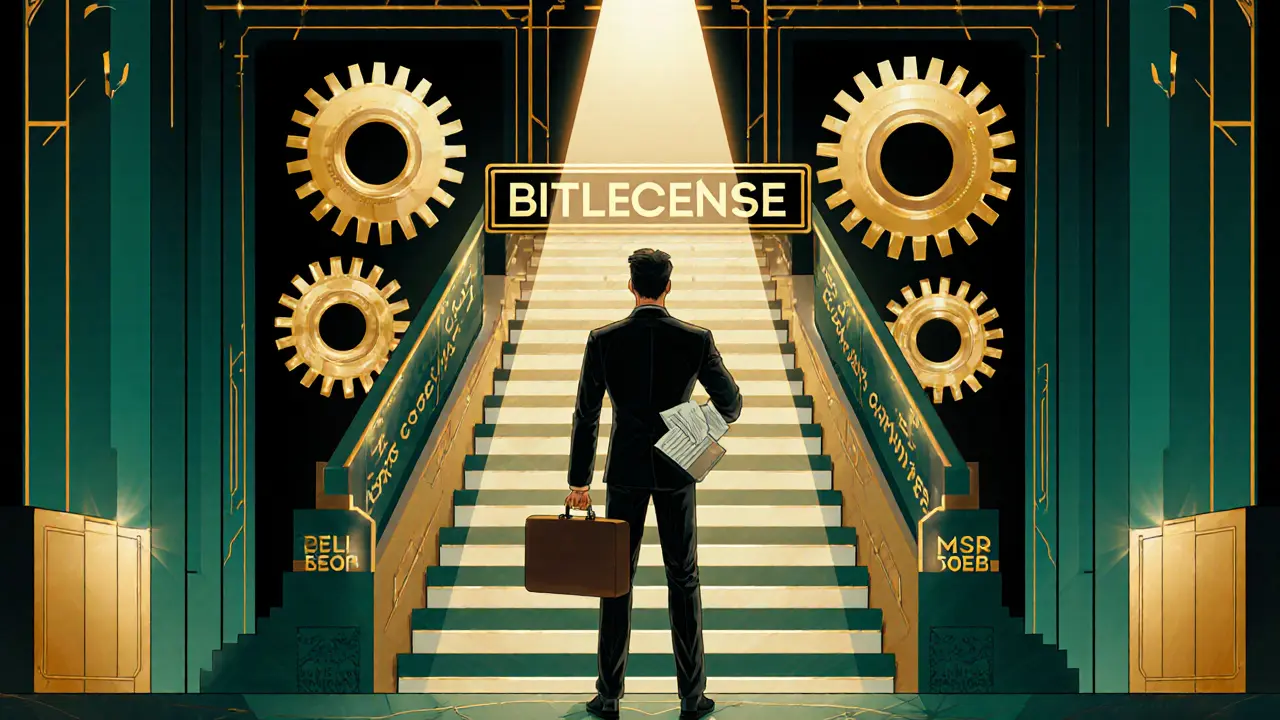Getting a crypto exchange license isn’t just about setting up a website and starting to trade. It’s a legal, financial, and operational marathon that requires planning, money, and deep understanding of rules that change every year. If you think you can skip the paperwork and launch fast, you’re setting yourself up for shutdowns, fines, or worse-criminal charges. In 2025, regulators are watching closer than ever. The crypto exchange license isn’t optional if you’re handling crypto-to-fiat swaps, custody, or trading security tokens. It’s the only way to operate legally in most major markets.
What Exactly Is a Crypto Exchange License?
A crypto exchange license is a legal permit that allows a business to operate a platform where users can buy, sell, or trade cryptocurrencies. But it’s not one single document. It’s a mix of federal registrations and state-level permits that depend on what you do. If you’re only letting users trade Bitcoin for Ethereum, you need one thing. If you’re letting them cash out Bitcoin to USD and send it to a bank account, you need something much bigger. At the federal level, the Financial Crimes Enforcement Network (FinCEN) requires every crypto business that moves money to register as a Money Service Business (MSB). That’s step one. But if you’re handling U.S. dollars, you’ll also need a Money Transmitter License (MTL) from each state where you plan to serve customers. Some states, like New York, have their own extra layer: the BitLicense. Others, like Illinois, don’t require it at all for pure crypto-to-crypto trading.Key Federal Requirements: MSB Registration and AML/CFT
Before you even think about state licenses, you must register with FinCEN as an MSB. This isn’t a form you fill out in an hour. You need a full Anti-Money Laundering (AML) and Countering the Financing of Terrorism (CFT) program. That means:- Written policies for customer identification and risk assessment
- Employee training on spotting suspicious activity
- Systems to file Suspicious Activity Reports (SARs) with FinCEN
- Recordkeeping for five years on all transactions over $3,000
State-by-State Licensing: The Real Bottleneck
Federal registration is just the floor. States control who can actually touch U.S. bank accounts and serve customers. And each one has different rules.- New York: Requires a BitLicense from NYDFS. Minimum capital: $500,000. Background checks on all owners. Daily reporting on trading volume. Takes 6-12 months to get approved.
- California: Requires an MTL. Minimum financial responsibility: $250,000. Must carry surety bonds. No BitLicense, but stricter KYC than most.
- Texas: MTL required. No minimum capital, but must prove operational stability and have a U.S.-based compliance team.
- Illinois: Exempts pure crypto-to-crypto exchanges from licensing. Still needs FinCEN MSB registration.
- Florida: MTL required. Must submit audited financial statements annually.
What If You’re Only Doing Crypto-to-Crypto?
You might think, “I don’t touch dollars, so I’m fine.” Not quite. Even if you only trade Bitcoin for Ethereum, you’re still subject to FinCEN’s MSB rules if you’re acting as a middleman. The regulator doesn’t care if you’re converting to USD or not. If you’re facilitating transfers between users, you’re a money transmitter. The only exception is if you’re running a peer-to-peer platform where users trade directly without your platform holding funds. Even then, you need clear disclaimers and no custody. If your wallet holds users’ coins-even temporarily-you’re likely regulated.
Special Cases: Custody, Stablecoins, and Lending
If you’re doing more than trading, the rules get even more complex.- Custody services: If you hold users’ crypto for them, you need approval from state banking agencies or the OCC. Some states treat this like a bank.
- Stablecoin issuers: If you’re issuing a coin pegged to the dollar (like USDT or USDC), you need to prove you hold enough reserves. New York and California are cracking down hard on unbacked stablecoins.
- Crypto lending: If you pay interest on crypto deposits, you’re likely seen as offering a security. That puts you under SEC jurisdiction. You may need to register as an investment advisor or broker-dealer.
- Payment processors: If you let merchants accept crypto and convert it to fiat automatically, you need a payment processor license in every state you operate.
The Cost: Time, Money, and Legal Help
You can’t DIY this. The average cost to get licensed in one state runs between $150,000 and $300,000. That includes:- Legal fees for structuring your company and drafting compliance manuals
- Application fees (some states charge $10,000+ just to submit)
- Minimum capital deposits (cash or bonds)
- Insurance (errors and omissions, cyber liability)
- Compliance software for KYC and AML monitoring
- Monthly ongoing costs for audits and reporting
Onshore vs. Offshore: What’s Better?
Many startups look offshore-places like Malta, Singapore, or the Cayman Islands-because licenses there are faster and cheaper. But here’s the catch: if your customers are in the U.S., you still need U.S. licenses. A Cayman license won’t let you open a U.S. bank account or serve American users legally. The only real advantage of offshore licensing is if you’re targeting international users. But even then, regulators in the EU, UK, Canada, and Australia have their own rules. You’re trading one set of headaches for another. The smartest move? Start in a U.S. state with clear rules-like Wyoming or Nevada-and use that license to open a U.S. bank account. Then expand. A U.S.-based license gives you credibility with payment processors, investors, and users.
What Happens If You Don’t Get Licensed?
In 2024, the SEC shut down over 15 crypto platforms for operating without proper registration. Fines ranged from $5 million to $50 million. Some founders faced criminal charges. Unlicensed exchanges can’t get bank accounts. Payment processors like Stripe and PayPal block them. Users can’t withdraw funds. Your platform becomes a target for hackers because there’s no regulatory oversight to enforce security standards. And when regulators do come after you, they don’t ask nicely. They freeze assets, seize servers, and go after personal assets of founders. The cost of skipping compliance isn’t just financial-it’s personal.How to Start Right
If you’re serious about launching a crypto exchange, here’s your roadmap:- Define your exact services: Are you doing fiat on/off ramps? Custody? Derivatives? This determines which licenses you need.
- Hire a crypto compliance lawyer. Don’t use a general attorney. Look for firms with proven experience in FinCEN and state licensing.
- Set up your corporate structure: LLC or corporation? Where? Delaware and Wyoming are popular for their business-friendly laws.
- Apply for FinCEN MSB registration first. This takes 6-8 weeks.
- Choose your first state to license in. Start with one where rules are clear and capital requirements are lower.
- Build your KYC/AML system before applying. Use tools like Sumsub, Jumio, or Trulioo.
- Secure your capital. You need the money in a bank account before you apply.
- Submit your application and prepare for a long wait. Don’t launch until you have the license in hand.
Future of Crypto Licensing
Regulators aren’t slowing down. In 2025, expect:- More states adopting strict MTL rules
- FinCEN requiring real-time transaction monitoring
- SEC cracking down on unregistered token listings
- Banking restrictions tightening for any crypto business without a license
Do I need a license to run a crypto exchange if I’m outside the U.S.?
If you’re not serving U.S. customers, you don’t need a U.S. license. But you still need to comply with your own country’s rules. Many countries, including the UK, Canada, Japan, and Australia, require their own crypto licenses. If you want U.S. customers or U.S. bank accounts, you’ll need a U.S. license regardless of where you’re based.
Can I get a crypto license without any money?
No. Every state that requires a Money Transmitter License also requires proof of financial stability. Minimum capital ranges from $250,000 to $500,000. You need to show that money is in a bank account or backed by a surety bond. No exceptions. If you don’t have the capital, you can’t legally operate.
How long does it take to get a crypto exchange license?
It takes 6 to 18 months. FinCEN MSB registration takes 6-8 weeks. State applications like New York’s BitLicense can take 10 months or longer. Most applicants get rejected on the first try due to incomplete AML policies or weak financial documentation. Planning ahead and hiring experienced legal help cuts the timeline significantly.
What’s the difference between an MSB and a Money Transmitter License?
An MSB is a federal registration with FinCEN that applies to any business handling money transfers, including crypto. A Money Transmitter License (MTL) is a state-level permit that allows you to actually move money between people or banks. You need both if you’re doing crypto-to-fiat transactions. MSB is mandatory. MTL is required per state.
Can I use a third-party to handle compliance instead of getting a license?
No. You can outsource KYC or AML monitoring to a vendor, but you can’t outsource legal responsibility. The license is issued to your company, and you’re legally liable for any violations. If your compliance vendor fails, you still get fined or shut down. The license must be in your name.




Leo Lanham
November 7, 2025 AT 07:07Kevin Mann
November 7, 2025 AT 21:11Kathy Ruff
November 9, 2025 AT 09:23Nitesh Bandgar
November 9, 2025 AT 22:02Colin Byrne
November 10, 2025 AT 19:48Brian Webb
November 12, 2025 AT 18:59Veeramani maran
November 14, 2025 AT 01:35Diana Smarandache
November 15, 2025 AT 01:30Chloe Walsh
November 16, 2025 AT 05:32Stephanie Tolson
November 17, 2025 AT 22:56Vivian Efthimiopoulou
November 19, 2025 AT 21:20Chris Hollis
November 20, 2025 AT 05:30Whitney Fleras
November 21, 2025 AT 04:55Grace Huegel
November 22, 2025 AT 11:10Jessica Arnold
November 23, 2025 AT 01:19Sunidhi Arakere
November 23, 2025 AT 17:43Robin Hilton
November 23, 2025 AT 23:25